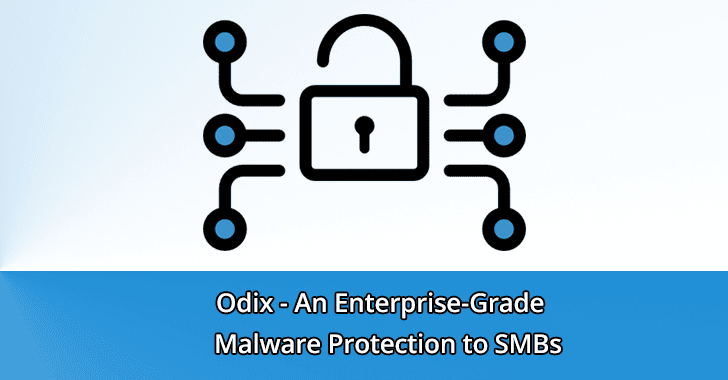Cybersecurity solutions provider odix has set its sights on bringing enterprise-grade cybersecurity to small to medium businesses (SMBs). The company specializes in file-based attack and malware protection which can greatly benefit smaller organizations, especially in today’s security landscape. SMBs are often susceptible to cyberattacks since they lack access to enterprise-grade solutions.
Fueling odix’s effort is the €2 million grant that the company recently received from the European Commission (EC). The EC, through its Horizon 2020 initiative, funds novel ideas that can support SMBs in order to boost growth and prosperity in Europe. The funding would allow odix to offer its solutions through the cloud as Software-as-a-Service (SaaS), making them more affordable and accessible to these companies.
“We are very excited to be
finally making this move to serve SMBs. Despite the emergence of more complex
threats, SMBs continue to lack access to capable solutions that can protect
them. The grant would enable us to continue development on our platform and
make our malware disarm technology available to these smaller organizations,”
odix CEO Dr. Oren Eytan remarked.
Next-Generation Solutions are Emerging
While there are now a variety of attack methods that threaten businesses, companies continue to be vulnerable to file-based attacks. Almost every office and workplace today work with digital documents enabling hackers to use office files to conceal malware. Unfortunately, employees are prone to downloading and launching files without subjecting them to the necessary security checks.
Some of these documents may seem legitimate
but they can actually house malware. When such a file is opened, the malware can
execute, perform its designed hack, and spread throughout the network. The
payload can destroy other important data or provide hackers ways to breach
networks.
Fortunately, more specialized and sophisticated solutions such as malware disarming tools have emerged to mitigate such attacks. odix is an emerging leader in this file-based attack protection segment. Malware Protection removes malicious code and exploits contained in files. When the file has been stripped away from the malware, it is then rebuilt into a safer version ready for execution. Next-generation solutions can counter threats that antiviruses and sandboxes have trouble detecting or eliminating.
“Today’s file-based attacks and malware have become quite sophisticated. Polymorphic malware, for example, constantly changes its code and characteristics. This makes it hard for antiviruses and malware Protection which rely on file signatures to detect and remove these threats. Our malware disarm technology is capable of accurately identifying malicious code within files and cleaning them,” Dr. Eytan added.
odix also features proprietary True CDR (content disarm and reconstruction) algorithm which ensures that files remain usable after the sanitization process. Through this approach, odix ensures that all files retain their type and only the malicious code is removed.

SMBs are Now Prime Targets
SMBs have become popular targets of cyberattacks largely due to their weak security measures.43% of cyberattacks target SMBs. In 2017,61% of data breach victims were companies with less than 1,000 employees. Falling victim to attacks can have dire consequences. SMBs not only can suffer losses due to downtime and corrupted data but also 60% of SMBs that get hacked are unable to sustain their businesses after six months.
File-based attacks are expected to increase over the coming years. Recently, ransomware has been among the most common payloads in malicious files. Ransomware encrypts and denies access to important files or documents unless a ransom is made.
Hackers figured that SMBs are more likely to pay the ransom since these companies have more to lose should they get locked out of their files. Most ransomware can encrypt thousands of employee and customer data and even project files and work output. In 2018, the average ransom demand was more than $116,000.
odix’s core technology, which has already been used by larger enterprises, successfully protected its users from popular ransomware outbreaks. None of odix’s clients were affected by Wannacry, Gandcrab, and Petya.
Conventional Measures Are Not Enough
SMBs usually dedicate their resources to other business areas such as sales and marketing. As such, they tend to overlook their cybersecurity and prefer to use free solutions such as antiviruses and personal firewalls. Unfortunately, most free antiviruses lack the ability to detect modern and complex malware.
Antiviruses typically rely on
signature detection which assumes that a previously detected malware in its
database will look the same in the future. This approach is now rendered almost
useless by hackers that use polymorphic code that allows malware to change its
appearance.
Another conventional cybersecurity measure that attempts to address file-based attacks is sandboxing. It uses an isolated environment where one can execute files to ensure that they will not harm other devices on the network.
However, sandboxing still has limitations. Advanced malware can detect a sandbox and, when it does, the malware can temporarily stop its execution.
In addition, cybercriminals can package malware into large files or different formats that a sandbox can’t process. Sandboxes also require dedicated personnel with technical knowledge which most SMBs lack.
Malware disarming is considered to
be a large improvement upon these solutions as it can capably cover areas that
antiviruses and sandboxes sorely lack. As SaaS, these solutions are expected to
become easier to use especially for smaller organizations with limited budgets
and technical knowledge.
Conclusion
As SMBs become the primary target of cybercrimes, making file-based attack protection available to these organizations cannot be timelier. When a small business is hit by a malware attack or data breach, not only is its operations jeopardized but its employees and clients are also put in danger.









